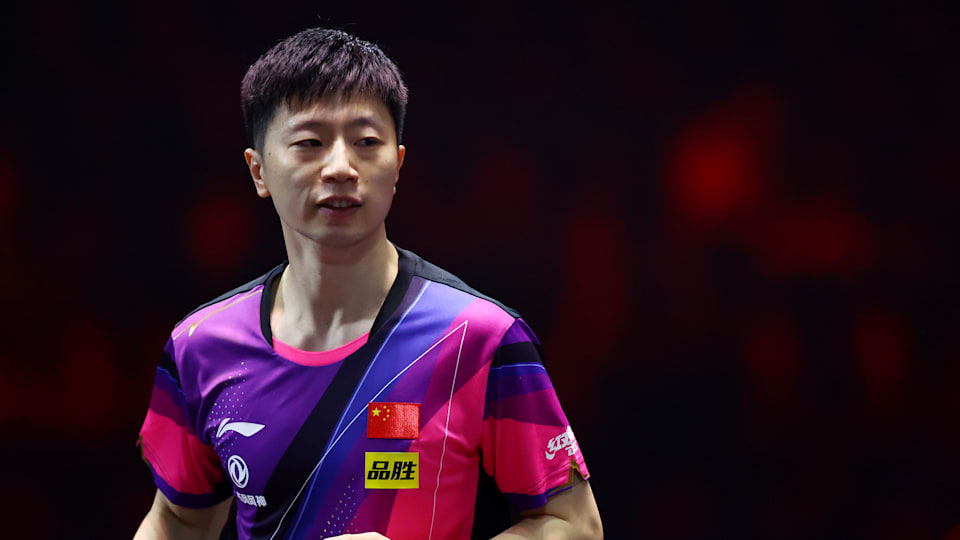Table tennis GOAT Ma Long: I still get nervous before playing
The five-time Olympic gold medallist discusses pressure and mental health, as well as opening up about his Olympic journey, from Beijing 2008 through to Tokyo 2020 in 2021.

Ma Long has won everything there is to win in table tennis. A multiple World and Olympic champion in addition to countless tour titles, the People's Republic of China paddler is arguably the greatest of all time.
You might think that gives him confidence. And while "the Dragon" undoubtedly remains one of the most feared opponents on the World Table Tennis circuit, the Chinese star has revealed that like a lot of people, he still gets anxious before taking to court.
Speaking to Olympics.com via the ITTF at last year's World Championships, Ma shared when asked if he still feels nerves before big matches: "Very nervous, and I'm getting ever more nervous."
Given one of Ma's other nicknames is "the Dictator" for the way he controls and dictates the play, that might seem out of character. But he explained that constantly winning does also weigh on him.
"I don't know if other athletes are like this, but for me, sometimes I think having won so much, people expect even more from you," Ma pointed out.
"They're expectant to see if you will continue to win. And sometimes, I also wonder whether I still have the want to win."
- Ma Long opens up on fatherhood and motivation in exclusive interview
- How to qualify for table tennis at Paris 2024: the Olympics qualification system explained
- Félix and Alexis Lebrun: The teenage French brothers ready to conquer the table tennis world
- Sun Yingsha: How the Youth Olympic Games helped propel my career
- Sun Yingsha: "A great athlete needs a healthy mindset"
Ma Long urges not to "ignore the psychological aspect"
Ma, the captain of the Chinese national team, explained that he always stops to take stock and react to each win.
"After you've won the championship a few times, everyone feels like you should have the upper hand and you should win the match. If you don't react with the correct mentality, (…) you will instead be more nervous," Ma shared.
"Or you become afraid that if you lose, people will question if you are getting old or should retire. With these external noises I feel it's about how you can judge what noise is good and what is bad, and for me this is quite an important thing right now."
Mental health is a topic currently at the forefront of world sports, with many big stars around the globe sharing their own struggles and the steps they take to maintain a healthy mentality.
"The Dragon" is no different in that regard, saying: "I think mental health is indeed a very important point, not only for athletes but for everyone.
"People always say be careful and pay attention to your body and focus on physical health, but this ignores the psychological stress that people experience too.
"Sometimes when you overthink something or have no way of resolving this stress, you ignore this aspect."
Ma shared that he thinks there are multiple possible solutions: speaking to coaches as well as other support staff, for one.
"As athletes, you might be under a lot of this sort of pressure, and when it comes to that, maybe people think communicating with coaches could solve this as coaches may have an athletes' background (and understand the situation). Sometimes, it's still the only system (to ease the issue).
"But I think it's possible that, gradually, psychologists or support staff are able to help athletes regarding mental health too. I feel this can be done."
Or, just hang out with close and trusted friends.
"They don't necessarily have to be able to understand this psychology thing, but maybe they say something helpful to you and it may be enough. Or they may not have to talk to you, but they go out with you for a meal or a drink, or just hang out with you.
"Sometimes, this kind of company is also a way to help with psychological stress."
Ma Long's Olympic journey, from reserve to five-time gold medal winner
That Ma has five Olympic golds is impressive, considering he was only a reserve at Beijing 2008 and only selected for the team event and not men's singles at London 2012.
He recalled going into the Athletes' Village in Beijing for a meal and to check out the facilities, but ultimately not feeling any pressure. "If you're not an athlete (competing), you don't experience this kind of tension or this kind of pressure. Your mentality is still different," he shared.
However, once he did make it as a competing athlete, he won all five events in which he took part (team at London 2012, team and singles at Rio 2016 and Tokyo 2020 in 2021).
"As long as there's Olympic competition being broadcast, regardless of whether you are a sports fan, you would watch it – including me – even if you didn't know anything about the sport before," Ma pointed out, adding that helped raise his profile, not just abroad but also at home.
"The Olympic Games have let more people know me or get familiar with me, and after I became a champion more people became fans of mine and started liking table tennis.
"All of this came from the platform of the Olympic Games. For both athletes, as well as the sport of table tennis, I think the Olympics is the biggest stage."
